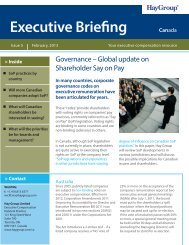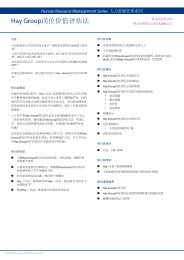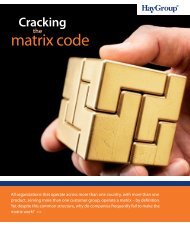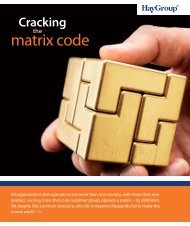Using Competencies to Identify High Performers - Hay Group
Using Competencies to Identify High Performers - Hay Group
Using Competencies to Identify High Performers - Hay Group
Create successful ePaper yourself
Turn your PDF publications into a flip-book with our unique Google optimized e-Paper software.
develop competencies. BEIs give the best results, and for key jobs or complex<br />
roles they are well worth the investment.<br />
Expert Panels<br />
Expert panels, or focus groups, use people who are knowledgeable about the<br />
job, such as outstanding performers, cus<strong>to</strong>mers, HR specialists, and line managers.<br />
The panel brains<strong>to</strong>rms the competencies needed <strong>to</strong> achieve outstanding<br />
performance in the job. Expert support is required <strong>to</strong> prevent the panel from<br />
producing either over-generalized competencies (motherhood statements), or is<br />
overly influenced by any one group.<br />
Panels typically do not generate the full range of competencies. In fact, they<br />
often miss some the most important, deeply rooted competencies. From our<br />
experience, panel data is are only about 50% as accurate as BEI data.<br />
Surveys<br />
Another method of collecting data is through surveys. While this is a quick way<br />
of generating data from a broad population, it is limited because it only provides<br />
responses <strong>to</strong> the questions asked. And, like expert panels, surveys often miss<br />
the hidden competencies that are unique <strong>to</strong> the job or the organization.<br />
Augmenting surveys with BEIs can improve the outcome, but still will not provide<br />
the richness of a model created from a larger number of BEIs.<br />
4. Data Analysis and Model Development<br />
Creating the models from BEIs is the most complex part of the process. The<br />
BEIs need <strong>to</strong> be analyzed thematically, i.e., in clusters according <strong>to</strong> themes related<br />
<strong>to</strong> patterns that are discernable in the interview. These will then generate<br />
hypotheses on what the competencies are and how they work <strong>to</strong>gether <strong>to</strong> produce<br />
outstanding performance.<br />
The desired outcome is a comparison of what outstanding performers do differently<br />
from average performers. If the two groups have been chosen well, the<br />
differences often stand out very clearly. The data are usually analyzed both thematically<br />
from the interviews and statistically <strong>to</strong> test for real differences between<br />
the two groups.<br />
Data from the selection<br />
processes or performance<br />
reviews is important because<br />
jobs evolve as situations<br />
change, and the competency<br />
framework should also be<br />
adjusted <strong>to</strong> reflect new<br />
requirements.<br />
WORKING<br />
PAPER<br />
8

















